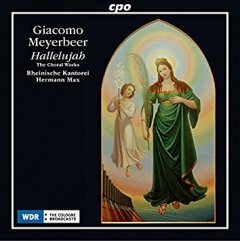Giacomo Meyerbeer - Hallelujah: The Choral Works (2016)
Giacomo Meyerbeer - Hallelujah: The Choral Works (2016)

Hallelujah. Cantata For Tenor, Bass, Organ And Choir 1. Hallelujah Psalm 91. Psalm Motet For Soloists And 8-part Double Choir 2. Der 91. Psalm Cantique. Hymn For Bass, 6-part Choir And Organ 3. Cantique Pater Noster. Motet For 4-part Choir A Cappella 4. Pater noster 7 Sacred Songs For Solo Voices And Choir A Cappella 5. Geistlicher Gesang Nr. 1 6. Geistlicher Gesang Nr. 2 7. Geistlicher gesang Nr. 3 8. Geistlicher Gesang Nr. 3 - Das Lied 9. Geistlicher Gesang Nr. 4 10. Geistlicher Gesang Nr. 5 11. Geistlicher Gesang Nr. 6 12. Geistlicher Gesang Nr. 7 An Mozart. Quartet For 4 Male Voices a cappella 13. An Mozart Rheinische Kantorei Hermann Max - conductor
Hermann Max and his Rheinische Kantorei present an entirely new facet in the oeuvre of the opera composer Giacomo Meyerbeer on this recording premiere of his sacred chroal works. In the booklet, Max himself writes, ""The protagonists of the Enlightenment influenced Giacomo's social network in letters and conversations during his early years. It was only logical that religious texts were viewed more in literary terms than as faith documents to be taken seriously. The stories from the Bible contradicting the laws of nature were taken more nonchalantly than with absolute seriousness and naive faith. Jesus often was mentioned no longer as the Son of God but as the most important human being ever born. As a principle operating against prejudices and intolerance, reason questioned everything religious and offered guidance contributing to the proper recognition of the laws of nature. For Meyerbeer, the fascination of religious texts lay in their musical setting as historical and literary material. Romanticists experienced ""time travel"" to regions located in the distant past as a departure from reality and the exploration of an imaginary world created by the mind. Giacomo enjoyed all of the above and was enthusiastic about what he learned as a traveler in Europe. His career as a virtuoso, which his great talent as a pianist when he was a boy had seemed to promise, was soon forgotten. Italy fascinated Meyerbeer. Especially Rossini and Salieri. He now kenw that it was right to have abandoned the oppressively dry instruction in composition that he was receiving from Zelter and to study in Darmstadt with Abbe Vogler. The Abbe cured him of self-doubts and opened his imagination to a vast ocean of compositional possibilities. ---Editorial Reviews, amazon.com
download (mp3 @320 kbs):








